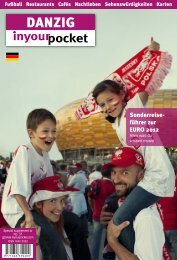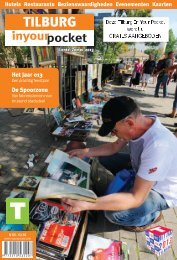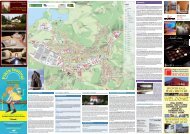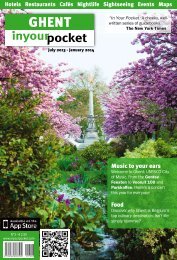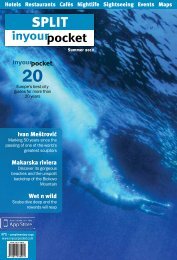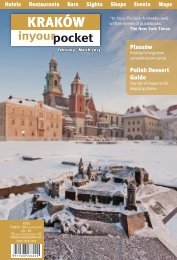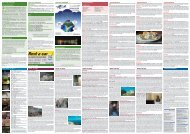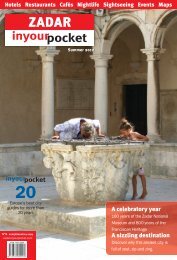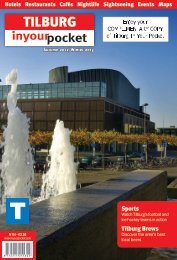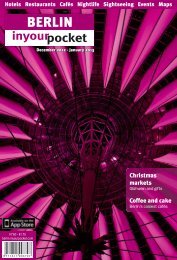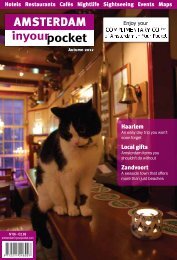7kh 7ul flw\ v prvw dxwkhqwlf 7h[ 0h[ uhvwdxudqw ... - In Your Pocket
7kh 7ul flw\ v prvw dxwkhqwlf 7h[ 0h[ uhvwdxudqw ... - In Your Pocket
7kh 7ul flw\ v prvw dxwkhqwlf 7h[ 0h[ uhvwdxudqw ... - In Your Pocket
Create successful ePaper yourself
Turn your PDF publications into a flip-book with our unique Google optimized e-Paper software.
20<br />
HISTORY<br />
The beginnings of colonisation<br />
in the Gdańsk area date back<br />
to the 7th century when it was<br />
a small group of fishing hamlets.<br />
Because of its strategic position<br />
at the head of the Vistula River,<br />
Gdańsk developed as an important<br />
trade centre.<br />
10th Century The first Christian<br />
mission comes to the small<br />
fishing village of Gdańsk. The<br />
Bishop of Prague, Adalbert, christens the inhabitants with<br />
the year 997 commonly accepted as the year that Gdańsk<br />
was founded.<br />
13th Century Gdańsk welcomes vessels from England, Sweden<br />
and the Walloon Lands. The Teutonic Knights penetrate<br />
Polish regions from the west in 1226.<br />
14th Century The Teutonic Knights make a treacherous<br />
assault on Gdańsk in 1308. The Knights meanwhile crown<br />
Malbork 60km south, the capital of their Teutonic state.<br />
<strong>In</strong> 1361 Gdańsk joins the Hanseatic League, a mercantile<br />
organisation, and its sea port prospers.<br />
15th Century Polish-Lithuanian forces defeat the Teutonic<br />
Knights at the Battle of Grunwald in 1410, thereby stopping<br />
German expansion eastward.<br />
16th Century Gdańsk enjoys a golden era, prospering into a<br />
rich seaport and important centre of trade and culture. Besides<br />
Germans, Gdańsk’s ethnic make-up is predominantly Polish,<br />
Dutch and Jewish, as well as a large number of Scotsmen.<br />
18th Century Poland becomes a playground for Tsar Peter<br />
the Great, and in 1734 Gdańsk is besieged by the Russian<br />
army. Austria, Prussia and Russia impose the first partition<br />
of Poland in 1773. Gdańsk loses its trade routes and falls into<br />
decline. A Prussian-Russian agreement on the second partition<br />
of Poland is concluded in 1793. <strong>In</strong> 1795 Austria, Prussia<br />
and Russia impose a third partition of Poland, ending Polish<br />
independence for more than a century.<br />
19th Century Gdańsk is established as a free city, with<br />
French troops stationed there. After Napoleon’s defeat and<br />
the Congress of Vienna in 1815, Poland is partitioned anew:<br />
Danzig (Gdańsk) is given back to Prussia. <strong>In</strong> 1871 it is officially<br />
incorporated into the German Empire.<br />
Early 20th century On 11th November 1918, Poland regains<br />
independence giving birth to what is regarded as the Second<br />
Polish Republic. With Germany defeated, the partition<br />
collapses leaving Gdansk caught in a tug of war between<br />
Germany and Poland who turn to the League of Nations to<br />
decide on control. Since the majority of the city’s inhabitants<br />
were German the city is not placed under Polish sovereignty,<br />
instead The Free City of Danzig is established in 1920 complete<br />
with its own parliament, currency and postal stamps. <strong>In</strong><br />
1939, WWII starts with Nazi Germany’s September 1 attack<br />
on Poland’s military posts at Westerplatte. From 1940-44 all<br />
Polish territory falls under Nazi occupation and becomes its<br />
primary killing ground. Six million Poles, including three million<br />
Jews, are killed. Although most of Gdańsk’s pre-war Jewish<br />
population managed to escape in time to avoid the Holocaust,<br />
much of Gdańsk’s Polish intelligentsia found itself rounded up<br />
and murdered in the nearby Stutthoff death camp. On March<br />
28, 1945, the Soviet Army seizes Gdańsk, now a smouldering<br />
mass of rubble. From 1945 Poland is Sovietised. Control of<br />
Gdańsk is given over to Poland, and most Germans exiled,<br />
replaced by refugees from east Poland. <strong>In</strong> 1947 the Communists<br />
consolidate political monopoly after rigged elections.<br />
<strong>In</strong> 1955 the Warsaw Pact is created. The 50s and 60s mark<br />
a time of major urban rebuilding following the large-scale<br />
wartime destruction of the city.<br />
By 1968 popular disenchantment begins and an opposition<br />
that will eventually overthrow the government is born.<br />
1970 The events of 1970 in Gdańsk are the first to rock the<br />
system. <strong>In</strong> December shipyard workers in Gdańsk strike to<br />
protest poor living standards. The army intervene to put an<br />
end to the protests, resulting in clashes in which 44 die. It is<br />
also in this year that West German chancellor Willy Brandt<br />
formally renounces German territorial claims to the city.<br />
1980-1989 A general strike is called in August 1980 by the<br />
fledgling Solidarność (Solidarity) trade union, led by shipyard<br />
electrician Lech Wałęsa. Martial law is declared the following year.<br />
<strong>In</strong> 1982 Solidarność is outlawed by the government and its leadership<br />
imprisoned. Other union activists are driven underground.<br />
<strong>In</strong> protest, more than 20,000 Gdańsk citizens take sanctuary in<br />
St. Mary’s Church in Gdańsk. <strong>In</strong> 1983 martial law is lifted. Wałęsa<br />
is awarded the Nobel Peace Prize. The late 1980s see a period<br />
of gradual liberalisation due in part to Soviet President Mikhail<br />
Gorbachev’s perestroika in the Soviet Union. Renewed strikes<br />
in 1988 and a failing economy convince General Jaruzelski to<br />
initiate talks with Solidarność. <strong>In</strong> 1989 Round Table talks produce<br />
a formula for power sharing between the Communists and<br />
Solidarność. Partly-free elections result in sweeping Solidarność<br />
victories and the communist regime crumbles.<br />
Post 1989 Finance Minister, Leszek Balcerowicz, launches<br />
an ambitious shock-therapy economic reform programme.<br />
Lech Wałęsa becomes Poland’s first democratically-elected,<br />
post-communist President. <strong>In</strong> 1995 reformed communist, Aleksander<br />
Kwaśniewski, defeats Wałęsa in presidential elections.<br />
The following year the Gdańsk shipyards are declared bankrupt.<br />
2001 sees flash floods hit the Tri-City area. Three people die.<br />
2004 May - Poland enters the European Union on May 1.<br />
2005 Pope John Paul II loses his battle against illness and<br />
passes away.<br />
2007 - Platforma (PO) defeat PiS, the party of the Kaczynski<br />
twins, which results in local boy Donald Tusk becoming<br />
Prime Minister.<br />
2010 - April 10th sees 96 high-ranking Poles tragically killed<br />
in the air disaster at Smolensk in Russia. Among the dead are<br />
President Lech Kaczynski and his wife along with a number<br />
of well-known Gdanskians including Solidarity’s Anna Waletynowicz,<br />
Senator Maciej Placzynski and MP Arkadiusz Rybicki<br />
whose funerals take place in various old town churches.<br />
Gdańsk through the Ages<br />
997-1308: as part of Poland<br />
1308-1466: as part of territory of Teutonic Order<br />
1466-1793: as part of Poland<br />
1793-1805: as part of Prussia<br />
1807-1814: as a free city<br />
1815-1871: as part of Prussia<br />
1871-1918: German Reich<br />
1920-1939: as a free city<br />
1939-1945: German Reich<br />
1945 onwards: part of Poland<br />
Gdańsk <strong>In</strong> <strong>Your</strong> <strong>Pocket</strong> gdansk.inyourpocket.com<br />
gdansk.inyourpocket.com<br />
TRI-CITY CULTURE & EVENTS<br />
Poland is an increasingly important centre of culture,<br />
and artisans, performers and musicians from all over the<br />
world now regularly arrive here to showcase their various<br />
talents. From art house sculptors to top-name bands,<br />
<strong>In</strong> <strong>Your</strong> <strong>Pocket</strong> is dedicated to bringing news of these<br />
events to as wide an audience as possible. Besides the<br />
listings on the print guide, we also regularly update our<br />
website with all the news and events as they reach us,<br />
sometimes after our print guide has gone to press. For<br />
the latest event information make www.inyourpocket.com<br />
the first place you visit.<br />
Art galleries<br />
Desa Gallery N-2, Gdynia, ul. Abrahama 54 (entrance<br />
from ul. Władysława IV), tel. (+48) 58 620 36 63.<br />
QOpen 10:00 - 18:00, Sat 10:00 - 14:00. Closed Sun.<br />
Admission free.<br />
Dworek Sierakowskich L-4, Sopot, ul. Czyżewskiego<br />
12, tel. (+48) 58 551 07 56, www.tps-dworek.pl.<br />
QOpen 12:00 - 19:00. Admission free.<br />
Engel Gallery N-2, Gdynia, ul. Świętojańska 56, tel.<br />
(+48) 58 620 91 67, www.galeriaengel.pl. QOpen<br />
11:00 - 19:00, Sat 11:00 - 15:00. Closed Sun. Admission<br />
free.<br />
Green Gate (Zielona Brama) C-5, Gdańsk, ul. Długi<br />
Targ 24, tel. (+48) 58 307 59 12, www.muzeum.<br />
narodowe.gda.pl. Q Open 09:00-16:00, Sat, Sun 10:00-<br />
17:00. Closed Mon. Last entrance 45 minutes before<br />
closing. Admission fee depends on the exhibition, check<br />
website for details.<br />
Günter Grass Gallery in Gdańsk C-4, ul. Szeroka<br />
34/35-37, tel. (+48) 58 304 98 54, www.ggm.gda.<br />
pl. QOpen 11:00 - 19:00, Tue, Wed 11:00 - 17:00. Closed<br />
Mon. Admission free.<br />
Profile Art Gallery N-3, Gdynia, ul. Wojewódzka 7,<br />
tel. (+48) 58 622 33 11, www.eraartprofile.pl. QOpen<br />
12:00 - 18:00, Sat 12:00 - 16:00. Closed Sun. Admission<br />
free. Y<br />
Sopot Auction Home (Sopocki Dom Aukcyjny)<br />
M-4, Sopot, ul. Bohaterów Monte Cassino<br />
43, tel. (+48) 58 550 16 05, www.sda.pl.QOpen<br />
11:00 - 19:00, Sat 11:00 - 15:00. Closed Sun. Admission<br />
free.<br />
ZPAP Gallery C-4, Gdańsk, ul. Mariacka 46/47,<br />
tel. (+48) 58 301 69 14, www.zpap-gdansk.art.<br />
pl. Also at ul. Piwna 67/68, B-4 (Open 11:00 - 17:00.<br />
Closed Sat, Sun) QOpen 09:00 - 17:00. Closed Sat,<br />
Sun. Admission free.<br />
Cinemas<br />
Cinema City Krewetka B-2, Gdańsk, ul. Karmelicka<br />
1, tel. (+48) 58 769 31 00, www.cinema-city.pl.QBox<br />
office open 09:30 - 22:45. Tickets 15-28zł. AU<br />
Helios Gdańsk Gdańsk, Alfa Centrum, ul. Kołobrzeska<br />
41c, tel. (+48) 58 767 99 88, www.helios.pl.QBox office<br />
open 09:00 - 22:00. Tickets 13-27zł.<br />
Multikino H-3, Gdańsk, Al. Zwycięstwa 14, tel. (+48)<br />
58 732 10 10, www.multikino.pl.QBox office open 09:00<br />
- 22:30. Tickets 15-27zł.<br />
Multikino O-1, Gdynia, ul. Waszyngtona 21<br />
(Gemini), tel. (+48) 58 731 39 10, www.multikino.<br />
pl/gdynia. Q Box office open 15 minutes before first<br />
showtime to 15 minutes after last showtime. Tickets<br />
13-27zł. U<br />
Multikino M-4, Sopot, Bohaterów Monte Cassino 63,<br />
tel. (+48) 58 741 75 10, www.multikino.pl.QBox office<br />
open 15 minutes before the first showtime to 15 minutes<br />
after last showtime. Tickets 18-27zł.<br />
State Art Gallery<br />
State Art Gallery (Państwowa Galeria Sztuki)<br />
M-4, Sopot, Pl. Zdrojowy 2, tel. (+48) 58 551 06 21,<br />
www.pgs.pl. <strong>In</strong>dividual exhibitions of major contemporary<br />
Polish artists. Q Open 11:00 - 19:00. Closed Mon.<br />
Admission 10/7zł.<br />
13.04 Friday - 03.06 Sunday<br />
Piotr Potworski - Visions of landscape<br />
Fifty years after the death of artist Piotr Potworski this<br />
exhibit highlight’s his numerous landscape paintings.<br />
These pieces serve as a biography of Potworski’s life,<br />
with many of the paintings showcasing places he lived<br />
throughout his career. On exhibit will be 40 landscapes,<br />
considered Potworski’s main motif, from museums<br />
around Poland.<br />
10.05 Thursday - 17.06 Sunday<br />
Jan Dobkowski - 70<br />
Explore more than 50 works by artist Jan Dobkowski,<br />
including paintings and drawings that span 1969-2007<br />
at this new exhibition at the State Art Gallery. Visitors<br />
will notice the exhibition is divided into three helpful sections:<br />
works on canvas, works on paper, and paintings<br />
from 1981-2001.<br />
31.05 Thursday - 07.07 Saturday<br />
Anna Szprynger - Horizons<br />
Artist Anna Szprynger is considered unique because her<br />
art is hard to categorize; just try to classify her work and<br />
you’ll find yourself stumped. The new Horizons exhibit<br />
showcases her interest in the geometric abstract and<br />
how together they are harmonious.<br />
07.06 Thursday - 23.09 Sunday<br />
Russian Avant-Garde from family collection<br />
of Żerlicynów - Żarskich<br />
This renowned collection of Russian Avant-Garde art will<br />
present works from the years 1910-1913 to the public for<br />
the first time. Since the 1960s the Żerlicynów-Żarskich<br />
collection has been highly regarded for both its artistic<br />
and historical value.<br />
22.06 Friday - 23.09 Sunday<br />
Jacek Malczewski from collection of National<br />
Art Gallery in Lviv<br />
One of Poland’s most important and well-known<br />
painters, Jacek Malczewski is known as the master or<br />
Polish symbolism and a career in which he combined<br />
the popular styles of his time (1854-1929) with motifs<br />
of national suffering and martyrdom. These works<br />
from the National Gallery in L’viv (formerly Polish<br />
Lwów) haven’t been seen in PL since 2001, when<br />
the exhibit was so wildly popular they’ve decided<br />
to bring it back. A great chance to see the work of<br />
a Polish master.<br />
May - July 2012<br />
21



